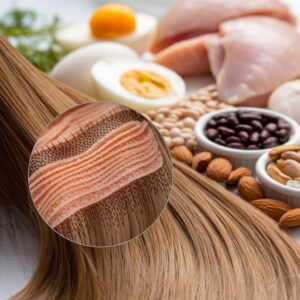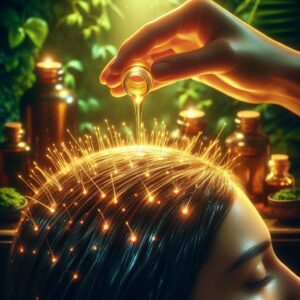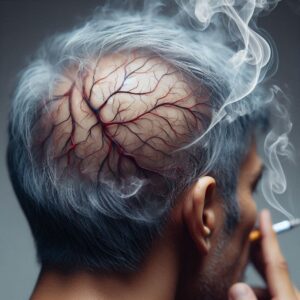The Ultimate Guide to Healthy Hair
Hair health is essential to overall wellness, and everyone should be familiar with the concepts that promote healthy hair. On the skin’s surface, you may find the protein keratin in the hair follicles. Layer one is the medulla; layer two is the cortex; and layer three is the cuticle, which makes up each hair.
How well these layers are taken care of determines the overall health and appearance of the hair. The health of the hair follicle, the living part of the hair, is affected by several things, such as heredity, age, and overall well-being. Keep the follicle in good condition if you want strong and vibrant hair growth.
When one is familiar with the basics of hair health, the three stages of hair development—a resting phase, a transitional phase, and a growth phase—become apparent. Everyday hair loss is normal for this cycle, but excessive shedding might indicate a more serious issue. Keeping a healthy scalp, encouraging strong hair follicles, and supporting the natural development cycle of hair are the cornerstones of good hair health.
Takeaways
- Several factors, such as genetics, diet, and way of life, influence hair health.
- Protein, minerals, and vitamins are the building blocks of healthy hair.
- Proper hair care and maintenance behaviours, such as washing and conditioning your hair regularly, may help prevent damage and promote hair health.
- Coconut oil and aloe vera are natural remedies for hair issues and improve overall health.
- To keep your hair in good condition, you should avoid using products and methods that are harmful to it, such as excessive heat styling tools and chemicals.
 The Importance of a Balanced Diet for Healthy Hair
The Importance of a Balanced Diet for Healthy Hair
Proteins and Their Worth
Protein is required to maintain healthy hair. Inadequate protein intake might result in weak, brittle hair or hair loss.
Hair-Favorite Minerals and Vitamins
In addition, vitamins A, C, and E, along with minerals like zinc and iron, are critical for promoting healthy hair growth. To ensure the body receives the nutrients necessary to maintain healthy hair, it is recommended to incorporate a variety of fruits, vegetables, lean meats, and whole grains into the diet.
Omega-3 Fatty Acids and Hair Repair
Another way to get shiny, moisturised hair is to eat foods rich in omega-3 fatty acids. Some examples of these foods include salmon and flaxseeds. Crash diets or severely restricting food consumption could lead to nutritional deficiencies, negatively impacting hair health. A mineral-rich, well-balanced diet is vital to healthy hair growth and long-lasting colour.
Proper Hair Care and Maintenance
Proper care and maintenance are key to promoting healthy hair. This involves washing your hair regularly with a gentle shampoo and conditioner made specifically for your hair type. Do not overwash your hair; doing so can strip it of its protective oils and lead to dryness and breakage.
In addition, chemical solid treatments and hairstyle tools generate excessive heat breakage. Regular haircuts are essential for healthy hair because they prevent breakage and broken ends. To further reduce the risk of harm, use a wide-tooth comb to detangle wet hair.
Protecting hair from the sun and pool chlorine may also cause damage. Protecting hair from environmental hazards, using gentle products, and avoiding overly harsh heat and chemical treatments are all part of good hair care and maintenance.
 Natural Remedies and Treatments for Hair Health
Natural Remedies and Treatments for Hair Health
Many all-natural remedies and therapies exist for maintaining healthy hair. Massaging the scalp with an essential oil, such as jojoba or coconut, can promote healthy hair growth. The hair follicles will receive more blood as a result. Aloe vera gel has several uses, one of which is soothing the scalp and encouraging the hair to retain moisture.
Also, you may try making your hair treatment with eggs, yoghurt, and honey to nourish and strengthen your hair. When used with regular hair care routines, these natural remedies can help fortify hair from the root up. It is important to remember that natural treatments may not be effective for everyone, even though they help some people.
Seek the advice of a medical professional or dermatologist before trying any novel natural remedies.
Avoiding Damaging Hair Practices and Products
If you want your hair to be healthy, you should avoid certain items. Do not use chemical treatments, such as bleach or perm, or heat tools, like curling wands or flat irons. Damage to the cuticle, as might occur with these treatments, can lead to dryness, breakage, and overall weakening of the hair.
Another method of drying out and harming your hair is using cosmetics containing a lot of alcohol or harsh chemicals. The most important thing is to read labels carefully and use gentle, hair-type-specific products. Another strategy to protect your hair from breakage is staying away from rubber bands with metal clasps or wearing hairstyles that are too tight.
If you want your hair to be healthy and strong, avoid damaging practices and products.
 Lifestyle Factors that Affect Hair Health
Lifestyle Factors that Affect Hair Health
What Effects Does Stress Have on Hair Health?
Hormonal disruptions caused by persistent stress might cause hair thinning or loss.
Cigarette Smoke and Its Effects on Hair
A faster rate of greying and hair loss has been linked to smoking because of the impact on blood flow to the scalp.
Ways to Maintain a Healthy Lifestyle for Your Hair
Dehydration, another consequence of consuming excessive amounts of alcohol, can compromise hair health and appearance. Exercise, sufficient sleep, and stress management are all components of a healthy lifestyle that may help keep hair in good condition. Drinking plenty of water is another way to keep your hair and scalp wet. Knowledge of the lifestyle factors influencing hair health is essential for promoting strong and vibrant hair.
Seeking Professional Help for Hair Concerns
If you have any irritation on your scalp, abnormally high shedding, or are concerned about your hair’s condition, it is important to seek the advice of an expert. A dermatologist or other trained medical professional can help you identify the source of your hair issues and provide insight into treatments and lifestyle changes that can foster healthy hair growth.
Diagnostic testing may be necessary when seeking professional help to identify any underlying medical conditions affecting hair health. Consulting a trichologist or other hair expert may also alleviate concerns about hair health and provide tailored recommendations for each hair type. See a professional if you want your hair issues fixed and want it to grow healthy.
FAQs
In what ways might one’s hair health be affected?
Factors such as genetics, diet, stress, hormonal changes, and environmental risks like pollution and sun exposure can all impact hair health.
How often should I wash my hair to keep it healthy?
While recommendations may differ by hair type, a good rule of thumb is to wash your hair no more than twice or thrice weekly to keep it in the best possible condition.
In the long run, how much of an impact does a healthy diet have on hair?
A well-rounded diet of protein, vitamins, and minerals (such as biotin, zinc, and iron) is essential for healthy hair. A lack of certain nutrients can lead to various health issues, including thinning hair.
What are some tried and tested ways to keep one’s hair in good condition?
Conventional wisdom holds that you can protect your hair from the sun, use a gentle shampoo and conditioner regularly, and avoid chemical treatments and heated styling products.
How can stress impact the health of a person’s hair?
Hair thinning, dullness, and loss are all symptoms of stress, which can harm hair health. However, practising relaxation techniques and caring for yourself can help maintain healthy hair.
At what points can an unhealthy hairstyle become problematic? Can you identify the warning signals?
Hair that is dry, brittle, split ends, excessively thinning, or dull might indicate sickness. Seek the advice of a hair care professional to resolve these issues.
Brought To You By:
The Article: Hair Health: Amity’s Guide To Healthy Hair appeared first on Lane End Hairdresser.
The Article Maintaining Healthy Hair: The Amitys Guide Was Found On https://limitsofstrategy.com
The Article Maintaining Healthy Hair: The Amitys Guide First Appeared ON
: https://ad4sc.com



Comments are closed